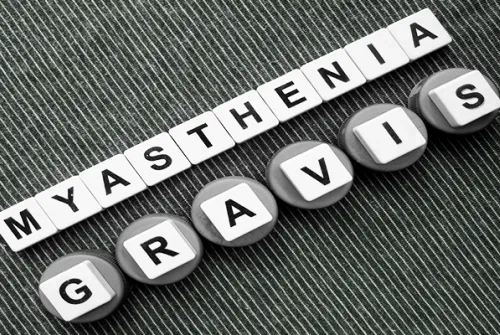Alo Yeditepe
Alo Yeditepe
What is Myasthenia Gravis Symptoms and Treatment Methods
Effective Results Can Be Achieved in the Treatment of Myasthenia Gravis, a Serious Muscle Disease
Myastenia Gravis, a serious muscle weakness disease, is actually a relatively unknown problem in society. Although its prevalence in the population is relatively rare, the annual incidence ranges between 7 to 23 new cases per million people. This condition predominantly affects young women and older men. Neurology specialist Dr. Yüksel Dede stated that the most common symptom of the disease is muscle weakness and fatigue, and he pointed out that the symptoms tend to worsen, especially after intense use of the muscles.
Myastenia Gravis (MG) is an autoimmune disease that occurs when the body's own immune system attacks the areas responsible for detecting signals between nerve cells and muscles, which are essential for communication. This results in the failure to transmit nerve signals to the muscles, leading to muscle weakness. According to information provided by Dr. Yüksel Dede, a Neurology specialist at Yeditepe University Koşuyolu Hospital, this problem, which has significant impacts on the patient's quality of life, can now be controlled and managed with new diagnostic and treatment methods available today.
Dr. Yüksel Dede states that MG is known to be associated with other autoimmune diseases such as neuromyelitis optica, autoimmune thyroid disease, systemic lupus erythematosus (SLE), and rheumatoid arthritis. He also mentioned that some studies have shown that the postpartum period in newly become mothers is a risky period in terms of developing the disease.
Attention to Muscle Weakness and Fatigue!
According to the information provided by Dr. Yüksel Dede, muscle weakness related to myasthenia gravis worsens with activity but improves after resting. However, both the severity of muscle weakness and the affected muscles can vary from person to person.
Dr. Yüksel Dede pointed out that due to the common similarities of the symptoms of the disease with different disorders, the diagnosis of myasthenia gravis can be delayed. He provided the following information regarding the symptoms of the disease: "The symptoms of myasthenia gravis include muscle weakness and fatigue. It can affect eye muscles, facial and chewing muscles, neck, arm, and leg muscles, and even respiratory muscles. Common symptoms include drooping eyelids, double vision, difficulty speaking, swallowing difficulties, respiratory difficulties, and overall muscle weakness. Especially, there is a fluctuating fatigue throughout the day; patients feel better in the mornings, but they complain about increasing muscle weakness towards the evening. The symptoms become more prominent as the muscles are used and improve after resting."
In most cases, effective results can be achieved in the treatment!
According to the information provided by Dr. Yüksel Dede, the diagnosis of MG is made by specialized physicians evaluating the patient. Firstly, a detailed medical history is taken from the patient with appropriate symptoms, followed by a comprehensive neurological examination, and the diagnosis is supported by tests such as blood tests and electromyography (EMG).
At this point, Dr. Yüksel Dede states that there is a treatment available for myasthenia gravis (MG) and effective results can be achieved in most cases. The primary goal of treatment is to control the symptoms, increase muscle strength, and improve the quality of life. Dr. Yüksel Dede provided the following information regarding the applied treatment: "In the treatment of MG, therapies are primarily aimed at addressing the signal disruptions between nerves and muscles, as mentioned earlier. Additionally, immune-suppressive treatments are applied to suppress the body's immune response against its own neuromuscular junction. The treatment approaches are tailored to each patient based on factors such as the patient's symptoms, the severity and extent of the disease. Treatment methods may vary, including oral medication, intravenous administration, or surgical procedures like thymectomy."
Regular follow-ups are crucial for the control of the disease!
Dr. Yüksel Dede reminds that myasthenia gravis is a chronic condition, and the treatment process usually continues throughout life. He stated, "However, with modern treatment methods and medications, most individuals can have their symptoms controlled and lead an active life. At this stage, regular medical follow-up is crucial for managing the symptoms and improving the personalized treatment plan for the individual."
Patients should pay attention to these!
Yeditepe Üniversitesi Koşuyolu Hastanesi Nöroloji uzmanı Dr. Yüksel Dede, reminding that it may be possible to reduce the severity of symptoms and improve the quality of life by taking some precautions, listed the things patients should pay attention to as follows:
● If you have been diagnosed with Myasthenia gravis, regular medical follow-up is essential. Your doctor can monitor the progression of symptoms, adjust your medications, and reorganize the treatment plan when necessary. Regular use of medications is crucial in Myasthenia treatment.
● Some medications that MG patients may need to use for other illnesses can trigger exacerbation of their condition. Therefore, before taking any medication, it is crucial to inform their doctors about the situation and consult with them.
● Supportive therapies such as physiotherapy, speech therapy, and respiratory exercises contribute to strengthening muscles, increasing mobility, and improving communication skills.
● People with Myasthenia gravis should pay attention to regular rest and sleep habits to manage their energy levels better. Planning physical activities, avoiding overly strenuous tasks, and resting when needed will assist in managing symptoms. Excessive stress can worsen symptoms, so stress-reducing activities like meditation and breathing exercises can be beneficial.
● MG patients may become more susceptible to infections, making protection against secondary infections important. Practicing hand hygiene, following vaccination schedules, getting up-to-date vaccines, and limiting contact with sick individuals can help reduce the risk of infections.
● Hot weather conditions can affect Myasthenia patients, and excessive heat can worsen symptoms. Therefore, it is essential to maintain a suitable room temperature and avoid being in excessively hot environments.
● Following a healthy and balanced diet and drinking an adequate amount of water will support overall health.
About
Faculty and Year of Graduation:
Celal Bayar University Medical Faculty, 2009
”
See Also
- What is Parkinson's Disease? What are the Symptoms of Parkinson's Disease?
- Pudendal Nerve Compression
- What is a Stroke (Apoplexy)?
- How to Protect Brain Health?
- What is Epilepsy?
- School Stress Invites Sleepwalking
- Daughter-in-Laws Care for Alzheimer's Patients
- As Insomnia Increases, Its Harmful Effects on the Immune System Also Increase
- 8 Tips for Better Sleep
- Initial Symptoms of ALS Considered To Be Nerve Compression
- Healthy Microbiota Reduces the Risk of Alzheimer's
Alo Yeditepe




